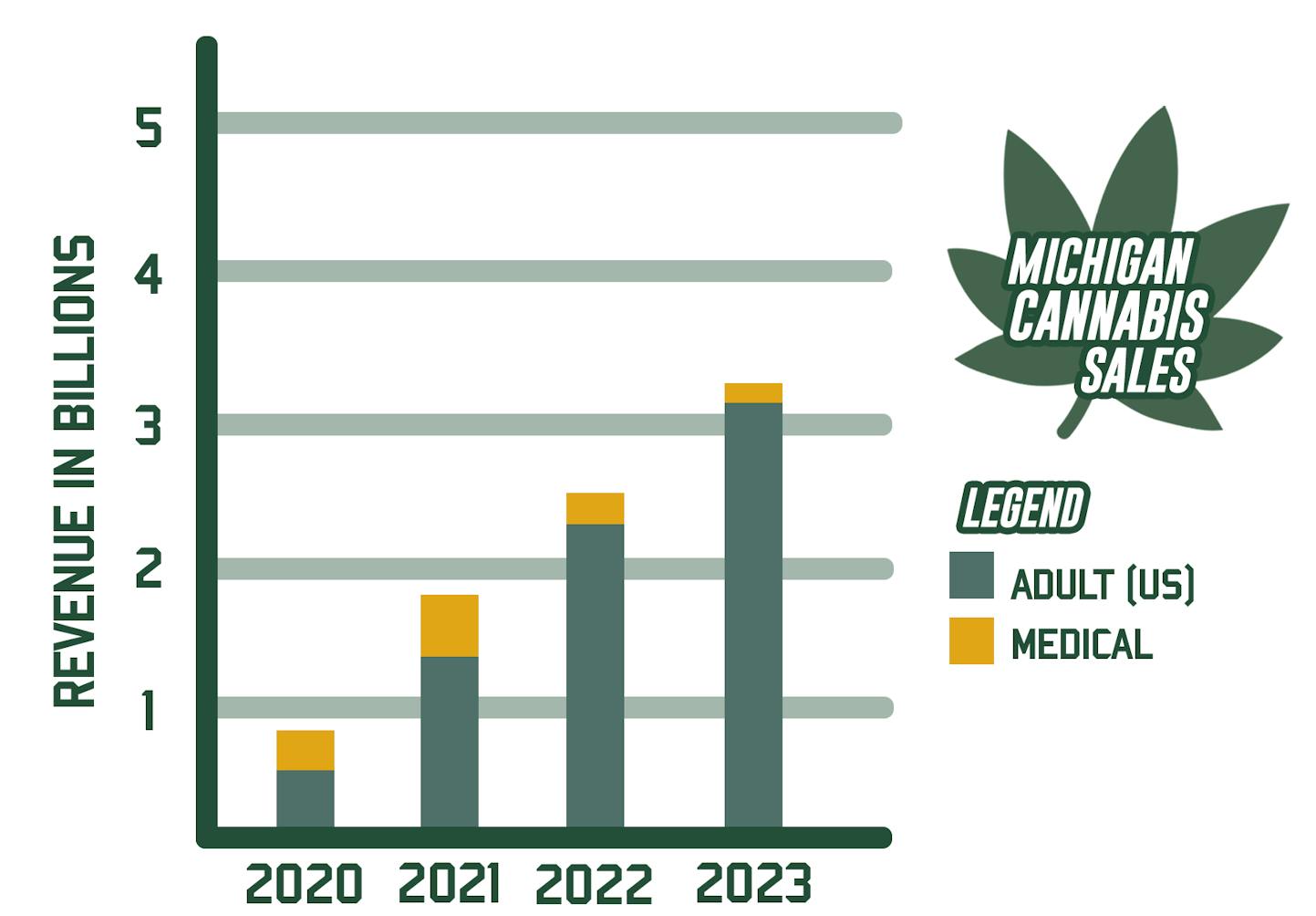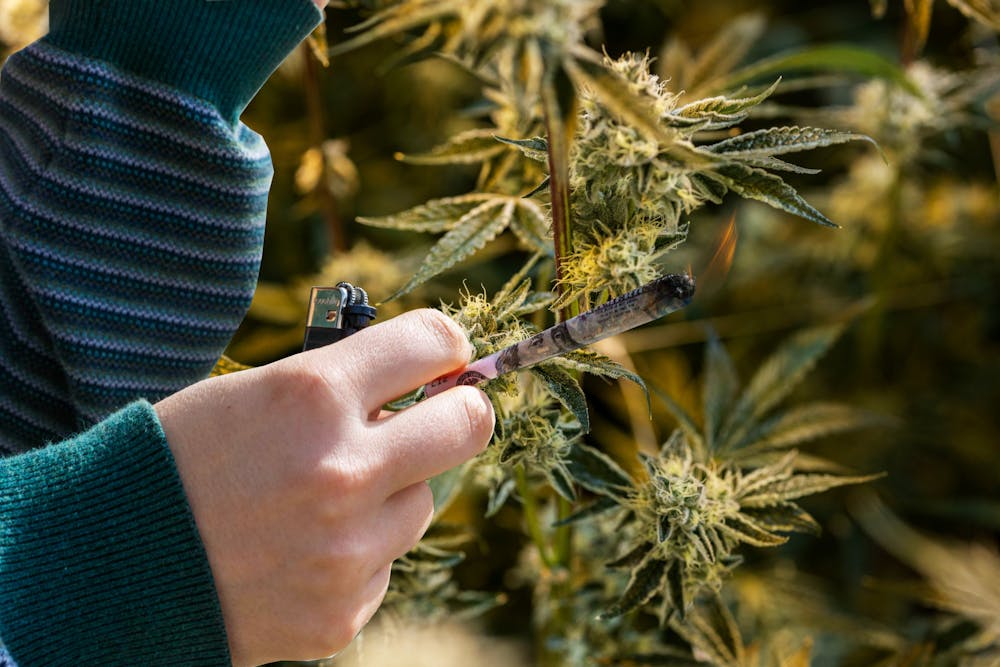The rise of cannabis
The rich, earthy aroma of cannabis fills the air, as a diverse array of adult customers flow in and out of The Woods in a steady stream. This scene has become a familiar sight at many recreational cannabis establishments across the state since its legalization in 2018.
Since then, the industry has experienced a surge, reaching new heights of popularity and demand.
In 2023, Michigan surpassed $3 billion in marijuana sales, according to the Cannabis Regulatory Agency. This was roughly $760 million more than what the state made in 2022.
The total sales made in 2023 amounts to about $305 worth of marijuana per capita – surpassing any other state in the nation, according to Marijuana Moment.
With the legalization of recreational marijuana, medical marijuana sales in the state have declined. In 2020, sales for medical marijuana was at $474 million; however, that number has since decreased by almost 83% to just $81 million this past year.
And as the demand for recreational marijuana grows, more cannabis businesses are emerging in the state.
Along with more business, cannabis industries are impacting local communities by bringing in more jobs and tax money, as well as improving the local infrastructure.
The shift has been felt in many communities across Michigan, including Mount Pleasant.

CM Life infographic | Kailey Hill
The History of Cannabis in Mount Pleasant
On Sept. 9, 2019, the Mount Pleasant City Commission approved a motion that allowed recreational marijuana establishments to operate in the city. However, the ordinance allowed for only three recreational licenses in the city.
One license belonged to JARS Cannabis and the other two belonged to two different Lume Cannabis locations.
Mount Pleasant City Commissioner Elizabeth Busch said this left residents with little variety.
“We wanted consumers to have a choice and it just felt like that limited their choice,” she said. “So that’s kind of one of the ways where the discussion got started.”
In 2022, conversations about revising the licensing regulations and the cap on the amount of licenses allowed in the city started back up.
After some back and forth about the amount of licenses to allow, the commissioners decided on May 23 of that year to completely eliminate the cap.
Despite initial community hesitations about a potential influx of retailers, Busch said she emphasized the self-regulatory nature of the market.
“The market will balance itself out,” she said. “Business owners are smart, and if there’s already 10 dispensaries in town, they maybe know it’s not the time to open up another one.”
The economic impact
Busch said there were many advantages for allowing more dispensaries into the city including:
• receiving more state tax
money;
• Buildings being renovated and
put back on the tax roll;
• and bringing more business
and jobs to the community.
According to the Michigan Cannabis Regulatory Agency, Mount Pleasant, as of March 2024, is home to nine adult-use marijuana retailers, which are the only retailers located in Isabella County.
Busch said the city received roughly $300,000 in taxes from cannabis businesses in 2023 alone. This is the second year the city has received income from these businesses, which goes toward the city’s general fund.
Patrick Kettler, the director of retail operations for Pure Options, said municipalities and other areas that opt in tend to see an increase in business, not just in the cannabis industry, but in other areas as well.
“What you have now is people who may be driving there to buy cannabis, they may visit local restaurants, they may visit local gas stations, things like that while they’re on their way,” he said.
On top of bringing in more business, Busch said the industry has also brought more people to the city through jobs, and that it’s something the city should take advantage of.
“We are in the center of the state,” she said. “As more and more people are growing legally, we could really take advantage of our location and be a source of jobs. There are already a lot of people who work in the marijuana industry here, so that’s what I’m hoping we can really hang on to ... the jobs.”
Another reason Busch said she has supported more cannabis businesses coming to the city has been because of their efforts to renovate buildings.
“(The city) give awards to the buildings that have done the most in terms of improving a business front, and the last three years it’s been marijuana licenses because they’re renovating and building good buildings here in Mount Pleasant,” she said.
Busch said the most recent winner of the 2023 commercial Community Improvement Award was The Woods, which had its grand opening on Jan. 27 of this year.
The award does not give any monetary contribution, but does provide a frame with a professional photo of the establishment.
Andrew Wirley, the store manager of the Woods, said the business has seen improvement over the past couple of months.
“It was a slow start at first just because this is one of our first places that we’ve had a lot more cannabis competition,” he said. “But in Mount Pleasant we’re doing pretty good.”
Shifting community perceptions
Shifting attitudes towards cannabis have also helped the industry’s growth in the state.
After adult-use cannabis was legalized, Kettler said many were and still are hesitant of cannabis industries in their local communities.
“There’s still a taboo, but we’re seeing that taboo start to go away a little bit,” he said. “Every year less and less people become judgmental.”
After working in the cannabis industry for two years, Wirley said he’s noticed the same thing.
“Two years ago, you talked about cannabis and they always tell you, ‘Hey, we want nothing to do with that,’” he said. “But now everybody’s kind of more open about just accepting it.”
Busch said in conversations with the community, there are still people opposed to cannabis businesses coming to the city.
“I know it still might be frustrating to some people who don’t necessarily want to see the cannabis stores around,” she said. “But my thought is, I would much rather see a nicely built and maintained cannabis store with good lighting and a nice parking lot than an abandoned, boarded up building on our main drag.”
The future of cannabis in Michigan
Looking ahead, both Kettler and Wirley are hopeful for the cannabis industry’s growth in the state.
“Michigan, out of any of the states, has one of the largest purchasing demographics,” Kettler said. “The progression continues to go up. And the more municipalities that opt in, you’re going to see the economy in that area continue to grow.”
Wirley said he sees the cannabis industry continuing to grow; however, he said cannabis becoming federally available could pose some potential challenges to smaller companies.
“Having personality on your own shops and being able to not have Uncle Sam (the federal government) or anybody looking over you and having more of a grasp in it allows us to make it as open and accessible to everyone,” he said. “I think it’s going up and it’s going in a good direction.”
However, Busch said cannabis becoming federally available is almost inevitable.
“This is the direction that the country is moving in,” she said. “But that’s another reason why I wanted to put my posting on the map before it was that way.”
A national cannabis boom
Legal cannabis is driving economic change all around the United States.
Starting with California in the late 1990s, states began to pass medical marijuana laws. Today, nearly 80% of U.S. states have legal medical marijuana and nearly half have recreational legality too, according to the National Conference of State Legislatures.
In Michigan, medical marijuana was legalized in 2008, and recreational legalization came ten years later.
In 2024, the U.S. is expected to generate the highest revenue globally in the cannabis market, with an estimated $42.98 billion, according to Statista, an online data gathering platform.
The current U.S. administration has shown more attention to the cannabis industry, with increased research and pardoning cannabis-related crimes, according to Cannabis Business Times
Federally, cannabis has been a Schedule I drug, along with heroin and LSD, since President Richard Nixon’s Controlled Substances Act of 1970 became effective.
However, times are changing, and many believe cannabis will soon be federally legal as more states incorporate it into their economy.
Some experts, like cannabis law firm Ice Miller, think 2024 could be the year for cannabis legalization.
With 24 states and the District of Columbia having legal recreational marijuana, only 10 states are needed to join in, in order to “force” federal change.
Under the Article V Convention, states can apply to propose an amendment. If two-thirds of the states, or 34, apply for a convention, Congress must convene one, according to the U.S. Constitution.
“With Congress remaining out of step with most of their constituents who support legalization, states forcing their hand may be what it takes to see action on the issues,” according to Ice Miller.
Cannabis Business Times identified 11 states on its radar for legalization this year including Wisconsin, Florida, Hawaii, South Dakota, Idaho, New Hampshire, Nebraska, Kentucky, Pennsylvania, North Carolina and South Carolina.
Florida, Idaho, Nebraska and South Dakota currently have campaigns aiming to put legalization questions before their voters in the November 2024 election.
In 2022, President Biden directed the Department of Health and Human Services (DHHS) to reconsider the federal drug classification of marijuana, according to Forbes. Last fall, the DHHS issued a recommendation to the Drug Enforcement Administration (DEA) that marijuana be reclassified from a Schedule I to a Schedule III drug.
“Rescheduling cannabis to Schedule III would have major consequences,” Ice Miller wrote. “The move would deal a blow to the stigma against cannabis and spell the end of discriminatory cannabis tax provisions that have crippled industry growth.”
A decision from the DEA is expected in early to mid-2024, according to Ice Miller.
Senior reporter Aurora Rae contribited to this report.




